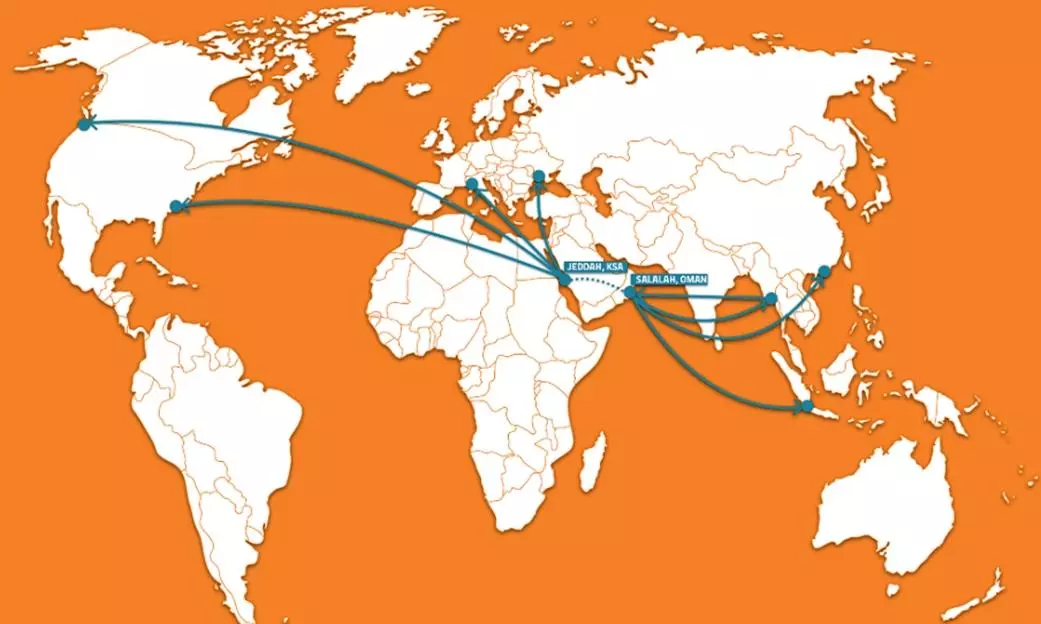Port of Salalah introduces multimodal alternative to Red Sea route
From the Port of Salalah, an in-transit overland route by truck connects to Jeddah located in the safer mid-point of the Red Sea in Saudi Arabia.

The Port of Salalah in Oman has launched multimodal service options that provide a viable alternative to the time-consuming and more costly re-routing around the Cape of Good Hope.
“With an annual capacity of 5 million TEU and expansion currently in progress to add an additional 30% capacity, the Port of Salalah is ideally located on the main ocean routes connecting South and East Asia with Europe, North Africa and the Americas, and the upper Gulf with East Africa,” reads the Port of Salalah release.
Unlike other popular transshipment ports in the region, no detour from the main East-West shipping routes into the Gulf of Oman is required, saving a 4-5 day detour from main east-west shipping routes.
The new multimodal solutions launched by the Port of Salalah offers Beneficial Cargo Owners (BCOs) and Shipping Lines cost-effective and fast alternatives between Asia the United States East Coast and European destinations.
From the Port of Salalah, an in transit overland route by truck connects to Jeddah located in the safer mid-point of the Red Sea in Saudi Arabia. The overland route takes approximately 4-5 days. From this point the journey can continue by container vessel through the Suez Canal to Europe or the US East Coast reducing the overall transit time under to current routing.
A further sea-air option provides a faster alternative for more time sensitive cargo into and out of Europe. Upon discharge in the Port of Salalah, cargo is transferred in transit to either Salalah or Muscat Airports or even Jebel Ali depending on availability of airlift capacity and connections. Salalah Airport offers state-of-the-art airfreight infrastructure, the ability to handle both narrow-and widebody aircraft, and sufficient spare handling capacity.
This option reduces the lead time compared to a full ocean leg and reduces cost compared to a full air freight option. The new multi-modal service reduces transit times by an estimated 20-40% compared to traditional east-west trade routes and could deliver a cost saving of 10-20% compared to a pure air-freight solution.
With scaleable warehousing, the availability of storage and modern Container Freight Facilities, the Port of Salalah can also be used to build in flexibility to supply chains and customer designed intermodal solutions.
These options have already been tested. The Port recently teamed up with Maersk, Oman Airports and Transom to introduce a number of sea-air solutions via the Port of Salalah with steady movements which are currently gaining momentum.
“A further option is to continue the sea journey through the Red sea through our trusted partners,” it reads.
Consistently ranked as the second most efficient terminal in the World in the Container Ports Performance Index (CPPI) published by the World Bank and S&P Global, Port of Salalah offers fast discharging and industry leading truck turn times.
“These high levels of efficiency means that the Port offers extremely high efficiency and cost competitiveness in comparison to other more highly marketed Port choices in the region,” says Sunil Joseph, commercial officer at Salah Port. “As we’re one of the busiest transhipment hubs in the region, our shipping line customers are not always aware that we have spare capacity to cater for all shipping lines – with clear market opportunities.”
Continual reforms aimed at enhancing the business environment in Oman are driving the development of faster intermodal solutions. “These reforms have matured to a stage where we proudly present Salalah as an unparalleled business opportunity,” says Joseph.
“Beyond merely a port, Salalah offers speed, an array of value-added services, flexibility, and streamlined business operations," he concludes.
"We excel in collaborating with BCOs, ensuring consistency and predictability in their supply chains, to providing multi-modal product offerings that unlock tomorrow’s potential today. We also facilitate seamless transshipments for shipping lines, thereby enhancing market access and navigating the disruptions caused by geopolitical or other developments beyond their control.”



